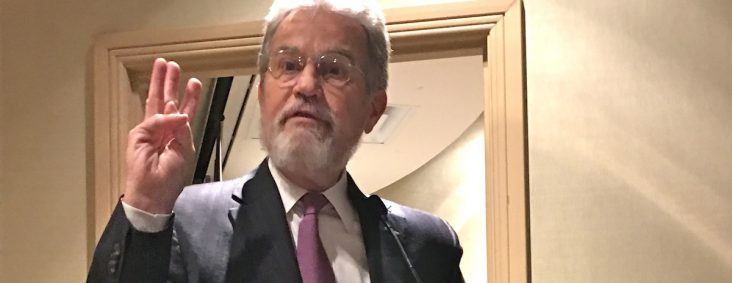Former U.S. Senator known as ‘Dr. No’ urges yes vote for Convention of States
by November 2, 2016 7:49 am 514 views

Former U.S. Sen. Tom Coburn, R-Okla., was in Little Rock on Tuesday (Nov. 1) advocating for a Convention of States.
Government and the national debt have grown so large that the states must restore balance through a never-before-used provision in the Constitution, said a former U.S. senator from Oklahoma.
U.S. Sen. Tom Coburn, a Republican who spent 16 years in Congress, pushed the Convention of States before about three dozen Arkansans Tuesday (Nov. 1) who had gathered in Little Rock to show their support for the idea.
A physician known as “Dr. No” while in Congress and author of the book “The Debt Bomb,” Coburn urged those in attendance to support the move to hold a convention to amend the Constitution under Article V of that document.
All previously enacted amendments have been initiated by Congress. Tried but never before successful, an Article V convention would be initiated when 34 states agree on a resolution – this one to enact fiscal restraints on the federal government, limit its power, and limit the terms of federal officials and members of Congress. In the convention, a majority of states must agree on amendments that must then be approved by 38 states.
Eight states have enacted a Convention of States resolution. An effort to pass one in Arkansas in 2015, sponsored by Rep. Bob Ballinger, R-Hindsville, passed the House but died in the Senate Committee on State Agencies and Governmental Affairs.
Brent Dove of Rea Valley in north-central Arkansas, the group’s state director, said Ballinger will again sponsor a resolution in 2017. Sen. Gary Stubblefield, R-Branch, will sponsor the resolution in the Senate. Dove told attendees the movement will increase momentum after this year’s presidential election, when people realize the election has changed nothing.
Ken Clark, regional director, said the movement hopes to find a district captain in each of the state’s 100 legislative districts.
Dove said the effort is bipartisan and the movement should have respect for people with different views. The goal is to get to 34 states so the conversation can begin. Coburn said he has traveled in 35 states during the past two years and found a general unease throughout society with the country’s direction. But while the effort is pushing for passage in every state, the speakers acknowledged that deep-blue states such as Massachusetts will not support the resolution. Clark said resolutions will be needed in four “purple” states like Colorado to get to 34.
Coburn, who struck up a friendship with President Barack Obama while both were in the Senate, said there is “an unsettledness in America because in our gut we know things aren’t right.” He said earlier republics like the United States have ultimately failed because of debt, a concentration of power and a decline of virtue.
“We’re moving in a direction that’s not compatible with survival as a free society, and the danger is we’ll get further and further divided, and then you’ll see anarchical-type activities occur, which will be terrible for our country,” he said. “So part of this movement is to take the steam off to give people a way to say, ‘Hey, wait a minute. Things aren’t right. Let’s fix it.’”
Coburn said Congress will not address the problems because members of that body will always act expediently and avoid making difficult choices without a constitutional provision requiring them to do so.
He said the movement hopes to add eight to 12 states this year, creating a total of 16-20. As the number rises, pressure will increase on members of Congress.
“When we get to 28 (states), I want to tell you Washington’s going to start changing,” he said. “And when we get to 30, they’re going to start changing rules and regulations. And when we get to 34, they’ll pass this stuff out faster than any Convention of States ever thought about passing. Because the number one thing they like is keeping their job. Just look at the number of 80-year-olds running for re-election.”
He said the country’s problems are fixable.
“I’ve got eight grandkids. What a terrible legacy to leave my grandkids if I don’t work every day to try to fix what’s coming for them,” he said.
